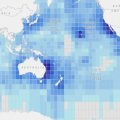There is still time to save the world’s ailing coral reefs, if prompt and decisive action can be taken to improve their overall health, according to a team of leading marine researchers.
Writing in the journal Trends in Ecology and Evolution, eminent marine scientists from Australia and the USA have called for an international effort to improve the resilience of coral reefs, so they can withstand the impacts of climate change and other human activities.
The team includes co-author Professor Peter Mumby of UQ's School of Biological Sciences.
“The world’s coral reefs are important economic, social and environmental assets, and they are in deep trouble," Jeremy Jackson from the Scripps Institution of Oceanography said.
"How much trouble, and why, are critical research questions that have obvious implications for formulating policy and improving the governance and management of these tropical maritime resources.”
The key to saving the reefs lies in understanding why some reefs degenerate into a mass of weeds and never recover – an event known as a ‘phase shift’ – while on other reefs the corals manage to bounce back successfully, showing a quality known as resilience.
This underlines the importance of managing reefs in ways that promote their resilience, the researchers say.
They presented evidence that coral decline due to human activity has been going on for centuries, but has been particularly alarming in the past 50 years. In all some 125,000 square kilometres of the world’s corals have disappeared so far.
The most recent global report card (2008) estimated that 19 percent of all reefs were effectively lost, another 15 percent were critical and likely to be lost in 10–20 years, and a further 20 per cent are under threat from local human pressures (already experiencing 20–50 per cent loss of corals).
The remaining 46 percent of reefs were at low risk from direct human impacts, but were nevertheless vulnerable to climate change and ocean acidification.
Taking an optimistic view, the researchers argue there is compelling evidence from sites in Hawaii, Australia’s Great Barrier Reef, the Caribbean, Bahamas and Philippines that the degradation and disappearance of corals can be arrested and reversed with the right management:
- In Hawaii, where ending sewage discharges allowed corals in Kanehoe Bay to recover
- In Australia, where weed-eating fish played a decisive role in keeping seaweed down while the corals fought back
- In the Caribbean where recovering sea urchin populations are helping to keep down weed and allow corals to recover
- In the Bahamas and Philippines, where controls on over fishing for parrot fish and other weed-eaters, also helped to restore coral cover.
“The coral reef crisis is a crisis of governance,” Professor Mumby said.
“We have a very good scientific understanding of what causes reefs to decline – what we now need is a clearer picture of how to help them back onto the reverse trajectory,” says lead author Professor Terry Hughes from the Australian Research Council Centre of Excellence for Coral Reef Studies at James Cook University.
The team has formulated the scientific lessons from resilient reefs into a set of management advice which governments can adopt to give coral reefs a fighting chance:
- Empower and educate local people to look after their own reefs
- Change land uses that cause damaging runoff and sediment
- Control not only fishing, but also fish markets to protect herbivorous fish
- Integrate resilience science with reef management and support for local communities in restoring their reefs
- Improve laws that protect coral reefs globally
- Confront climate change as the single most important issue for coral reef management and conservation by sharply reducing greenhouse gas emissions.
“Without urgent action, unchecked global warming and ocean acidification promise to be the ultimate policy failures for coral reef," they said.
"Although it is possible to promote the recovery of reefs following bouts of bleaching via local actions such as improving water-quality and protecting herbivores, these interventions alone cannot climate-proof reefs.”
“The clear message from our research, and that of other marine scientists, is that the world’s coral reefs can still be saved… if we try harder,” Professor Hughes said.
Their article “Rising to the challenge of sustaining coral reef resilience” by Terry P. Hughes, Nicholas A.J. Graham, Jeremy B.C. Jackson, Peter J. Mumby and Robert S. Steneck appears in the latest issue of Trends in Ecology and Evolution (TREE).
The future of Australia’s and the world’s coral reefs is the focus of a major scientific symposium in Canberra on October 7 and 8, at the Australian Academy of Science’s Shine Dome.
Program: http://www.coralcoe.org.au/events/symposium2010/program.html
More information:
Terry Hughes, CoECRS and JCU, +61 (0)400 720 164
Jeremy Jackson, Scripps Institution, +1 858 518 7613 or jbjackson@popmail.ucsd.edu
Nick Graham, CoECRS and JCU, 0466432188
Bob Steneck, University of Maine, steneck@maine.edu
Peter Mumby, The University of Queensland, p.j.mumby@uq.edu.au
Jenny Lappin, CoECRS, +61 (0)7 4781 4222 or +61 (0)417 741 638
Jim O’Brien, James Cook University Media Office, +61 (0)7 4781 4822 or 0418 892449
Jan King, UQ Communications Manager, +61 (0)7 3365 1120
Mandy Thoo, CoECRS media contact, 0402 544 391
CoECRS is sponsoring the 12th International Coral Reef Symposium, Cairns: 9-13 July 2012.
.jpg)










